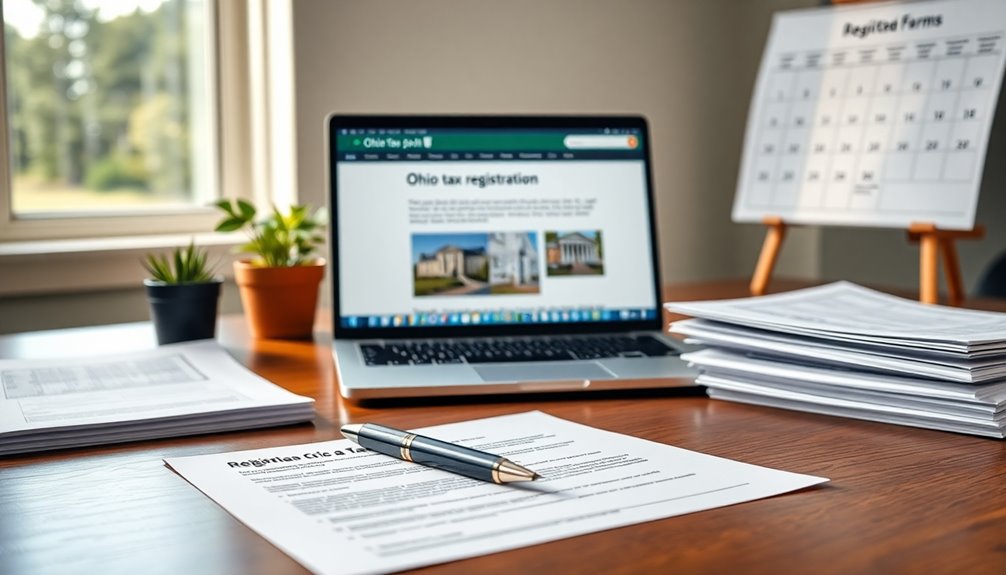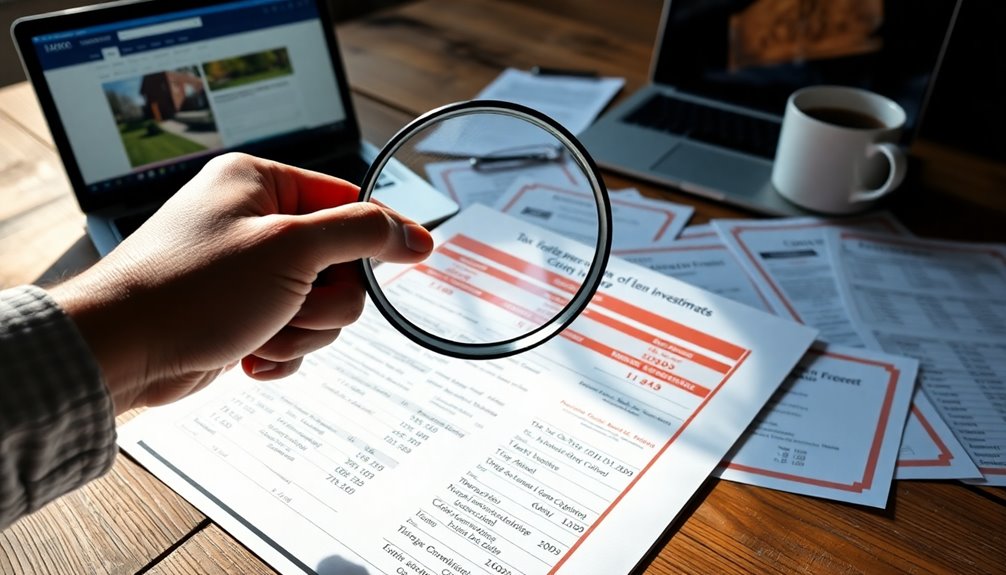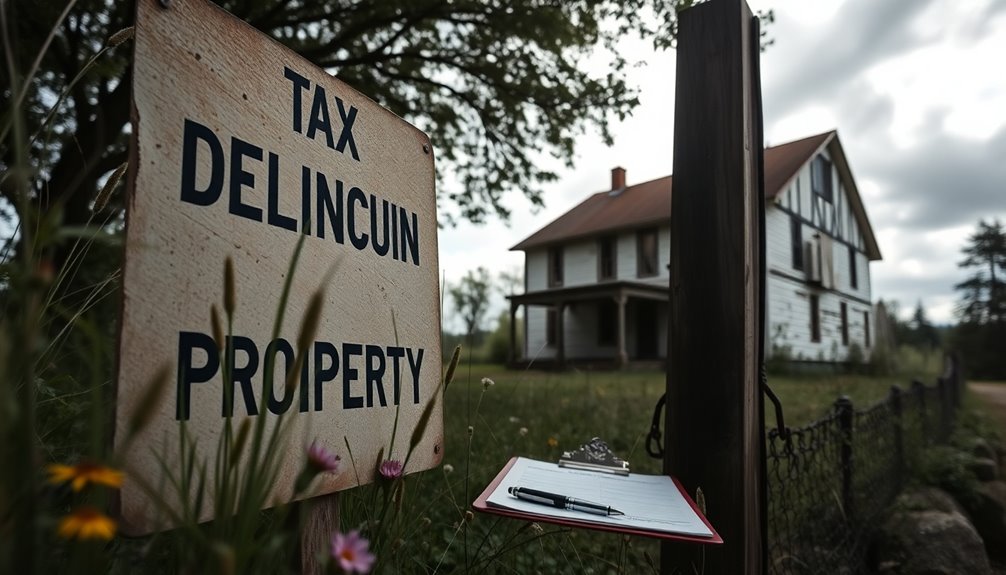To buy tax liens in Ohio, start by completing IRS Form W-9 for identification. You'll need a refundable deposit of $500 and a letter from a bank confirming sufficient funds. Next, fill out the Tax Certificate Sale Registration Form and submit it on time. Auctions occur in person or online, usually in late October or early November, where you can bid on liens. After winning, you'll pay around 10% on auction day, with the balance due within 14-30 days. Make sure to conduct due diligence on properties before participating, and there's more to consider beyond these steps.
Key Takeaways
- Complete the Tax Certificate Sale Registration Form and submit it along with a $500 refundable deposit to the county treasurer.
- Conduct due diligence by reviewing property records and assessing existing liens or encumbrances before bidding on tax liens.
- Participate in the auction, where you can bid down the interest rate or bid up the premium for the tax lien certificate.
- Pay approximately 10% of the total purchase price on auction day; balance is due within 14-30 days.
- Be aware of the one-year redemption period for property owners to pay off the lien and the potential for foreclosure if they fail to do so.
Understanding Tax Liens

Tax liens arise when property owners fall behind on their property tax payments, creating a financial obligation that can lead to serious consequences. When this happens, county treasurers sell the liens to recover the overdue taxes, interest, and penalties.
As a buyer, acquiring tax lien certificates gives you the right to collect the owed debt plus interest from the property owner. Tax liens take precedence over most other liens, including mortgages and judgment liens, making them a secure investment.
Property owners usually have a redemption period, often around one year, to pay off their debts and reclaim their property. If they don't, you can initiate foreclosure proceedings. The interest rate on tax liens varies by county but generally hovers around 18% per year. Interest is calculated monthly, with partial payments held by the Treasurer's Office until the total amount is paid. Additionally, counties can pursue delinquent taxes or sell tax lien certificates to recover the owed amounts.
Should foreclosure occur, the property gets sold at a judicial sale to settle the tax debt. You'll receive title to the property free from most encumbrances, allowing you to capitalize on your investment.
Understanding these basics is crucial as you navigate the world of tax lien investing.
Registration Requirements

To participate in tax lien auctions in Ohio, you'll need to meet specific registration requirements that ensure you're prepared to make a purchase.
First, complete an IRS Form W-9 to request your taxpayer identification number. Along with this form, submit a refundable deposit of $500 in the form of a cashier's check, money order, or certified check, made payable to the county treasurer. This deposit will be returned to unsuccessful bidders and applied to the purchase price for the successful bidder.
You'll also need to provide a letter from your financial institution confirming you have sufficient funds to cover the purchase price of the tax certificates. Make sure to include written authorization for the Treasurer's Office to verify this financial information. Without these documents, you won't be allowed to participate.
Additionally, complete a Tax Certificate Sale Registration Form and a purchaser contact information form. All required documents must be submitted on time, as late submissions will be rejected. It's essential to understand that auctions can be competitive; preparation is key for prospective bidders.
Keep an eye on the county treasurer's announcements for specific deadlines, typically set in early September for auctions held between late October and early November.
The Auction Process

Participating in the auction process for tax liens in Ohio can be both exciting and competitive. Auctions can take place either in person or online, with bidders having the option to bid down on the interest rate or bid up a premium to secure the lien. The bidder who accepts the lowest interest rate or pays the highest premium wins the lien, often leading to bidding wars that can drive down your return on investment. These auctions are typically held annually between late October and early November, with details becoming available online by early September. Expect property owners to receive multiple notices before the auction, and keep an eye out for updates on the final list of properties.
When it comes to bidding and payment, be prepared to pay a portion of your winning bid, usually around 10%, on auction day. The remaining balance is due within 14 or 30 days and must be paid via cashier's check, money order, or wire transfer. Investors can acquire liens for amounts starting from a few hundred dollars, making it accessible to a wider range of participants. Remember that your total purchase price will include taxes, penalties, interest, and any administrative fees, ensuring you know exactly what you're investing in.
Interest Rates Explained

Understanding interest rates on tax lien certificates in Ohio is crucial for making informed investment decisions. The interest rate can reach up to 18% simple interest, which applies to the entire amount of each lien, including administrative fees. You'll find that interest is calculated monthly, with 1/12 of the annual rate applied on the first day of each month. When you bid at an auction, the lowest interest rate typically wins the tax lien certificate. Keep in mind that the interest rate you bid will impact your potential profits. If the property owner doesn't redeem the certificate within the first year, the 18% interest continues to accrue for its validity period, usually three to six years. If the property owner redeems the certificate, they'll pay you the accrued interest up to that date. In cases of foreclosure, the interest rate can increase to 18% from the date the foreclosure is requested. Additionally, you can recover your purchase price, accrued interest, and costs related to foreclosure. Understanding these rates helps you navigate your investment strategy effectively and maximize potential returns. Moreover, it's important to note that all judgments in Ohio for the year 2024 will accrue interest at an 8% rate, which can impact how you evaluate tax lien investments.
Conducting Due Diligence

Before investing in tax liens in Ohio, conducting thorough due diligence is vital. Start by reviewing property records to ensure there are no other liens or encumbrances that could complicate your investment. Check the property's location, assessing its potential for future development or value appreciation. Evaluate its current condition and estimate any rehabilitation costs you might face.
Next, analyze the financial aspects. Calculate the total amount due, including taxes, interest, and penalties. Determine your break-even points based on fees and interest rates. Remember that administrative fees associated with tax lien certificates typically run around $300 per lien. Additionally, understand that interest rates for tax liens in Ohio can range from 12% to 16%, which can significantly impact your ROI.
Consider the potential return on investment (ROI) if the property owner redeems the lien, but also weigh the risks of foreclosure if they don't.
Ensure you're compliant with Ohio Revised Code sections 5721.30 to 5721.43, and familiarize yourself with the delinquent tax collection process. Review the county treasurer's terms for the tax lien sale, including required documentation and deposits.
Post-Auction Responsibilities

Once you've successfully bid on a tax lien in Ohio, your responsibilities kick in immediately. First, you need to complete your payment. This requires a wire, cashier, or certified check payable to the county treasurer. Your initial $500 deposit is applied to the purchase price, but you must wire the balance, including fees, within three business days after the sale.
Payment details will be provided on the sale date, so make sure to have your funds verified before bidding.
Next, understand that the interest rate from your winning bid applies to the entire lien amount, including administrative fees. Interest is calculated monthly on a simple interest basis, with a rate of 18% on subsequent delinquent taxes. Additionally, be aware that the property owner receives notice before foreclosure if they fail to redeem the lien.
You'll also need to be aware of the redemption process. The property owner has one year to pay off the lien, and if they don't, you can start foreclosure proceedings. This involves preparing a Notice of Intent to Foreclose, which requires county treasurer approval.
Legal Considerations

After managing your responsibilities post-auction, it's important to grasp the legal considerations tied to tax liens in Ohio. Tax lien certificates hold superior priority under Ohio law, even over mortgages and judgment liens. If you buy a tax lien, ensure that you file it with the county recorder to establish your priority.
Remember, the county treasurer must first notify property owners before selling tax liens, so stay informed about the legal process.
When you win a bid at an auction, you receive a tax certificate, making you the lien owner. However, foreclosure can't begin until one year after the sale unless the property is vacant and abandoned. During this one-year period, property owners have the right to redeem the tax certificate by paying it in full with interest. Additionally, it's crucial to understand that the IRS liens generally have priority over Ohio tax liens, which may affect your investment strategy.
If the property owner makes partial payments, those are held by the Treasurer's Office until the balance is cleared.
Be aware that after the Judgment Entry of Confirmation of Sale is filed, the rights to redeem are severed. Understanding these legal frameworks helps you navigate the tax lien landscape effectively, protecting your investment.
Frequently Asked Questions
Can I Participate in the Auction From Outside Ohio?
Yes, you can participate in the auction from outside Ohio, but you'll need to check each county's specific rules first.
Some counties allow online bidding, while others require in-person attendance. You might also hire a proxy to bid on your behalf.
Make sure you've registered with the county treasurer, submitted necessary forms, and verified any deposit requirements.
It's crucial to understand the auction process fully before you jump in.
Are There Any Age Restrictions for Bidders?
There aren't any specific age restrictions for bidders, so you can participate regardless of your age.
However, you must meet certain financial and registration requirements.
Make sure you submit the necessary documents, including an IRS Form W-9, a letter from a financial institution verifying your funds, and a refundable deposit.
Keep an eye on the deadlines for submitting these documents to ensure you're eligible to bid.
What Happens if I Win but Cannot Pay the Deposit?
If you win but can't pay the deposit, you'll risk losing your winning bid and any deposit you've already made.
Each county has strict deadlines for payment, and missing those means you're disqualified from the auction.
It's crucial to ensure you have the necessary funds ready to avoid this situation.
Always check the specific requirements for the county where you're bidding to stay informed and compliant with their rules.
How Long Does the Redemption Period Last for Property Owners?
The redemption period lasts for one year after the tax lien sale.
During this time, you can redeem your property by paying off the delinquent taxes, fees, and interest.
It's crucial to act within this timeframe because if you don't, the tax lien purchaser can start foreclosure proceedings.
You can also set up a payment plan with the county treasurer if you can't pay the full amount at once.
Can I Transfer My Tax Lien Certificate to Another Investor?
Yes, you can transfer your tax lien certificate to another investor.
Under Ohio law, tax lien certificates are assignable, and you'll need to follow specific regulations to do so.
This process involves assigning your rights to collect or enforce the tax lien, which the new holder will assume.
Be sure to document the transfer and notify the County Treasurer's Office, as they might need to review the transaction.
Conclusion
Buying tax liens in Ohio can be a rewarding investment if you follow the right steps. By understanding the process, registering properly, and participating in auctions, you can secure potential profits. Remember to conduct thorough due diligence and stay aware of your post-auction responsibilities. Keeping legal considerations in mind will help you navigate this investment landscape safely. With careful planning and attention, you can successfully add tax liens to your investment portfolio.









